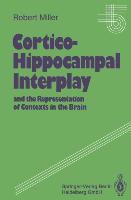- Start
- Cortico-Hippocampal Interplay and the Representation of Contexts in the Brain
Cortico-Hippocampal Interplay and the Representation of Contexts in the Brain
Angebote / Angebote:
1. 1 Contexts The principal issue with which this monograph deals is the role of the hippocam pus in establishing and using representations of contexts for information processing. However, before this issue can be addressed directly, it is necessary to ask "what is meant by the word 'context' ?". The first answer which comes to mind is likely to be something along the following lines: "A context is a framework (or background) of information with respect to whieh more specific 'items' ofinformation can be identified and manipulated". This answer may be correct, but it begs a fundamental question. Why should it be necessary to subdivide information into specific "items" of information, and the more global backgrounds, or frameworks? This question is especially pertinent if we are thinking of information representation in the brain, since neuroscientists (or at least the vast majority of them) believe that the basic way in whieh patterns of information are encoded in the brain is as combinations of connections, selected in a variety of ways. Since both "items" of information and "contexts" are just such patterns, apparently differing only in size, it is far from clear why there should be a categorical division between the two. ! This question is relatively new in the neurosciences. However, in a somewhat different guise it has been alive for a long time, since the publication ofImmanuel Kant's Critique 01 Pure Reason.
Folgt in ca. 5 Arbeitstagen
